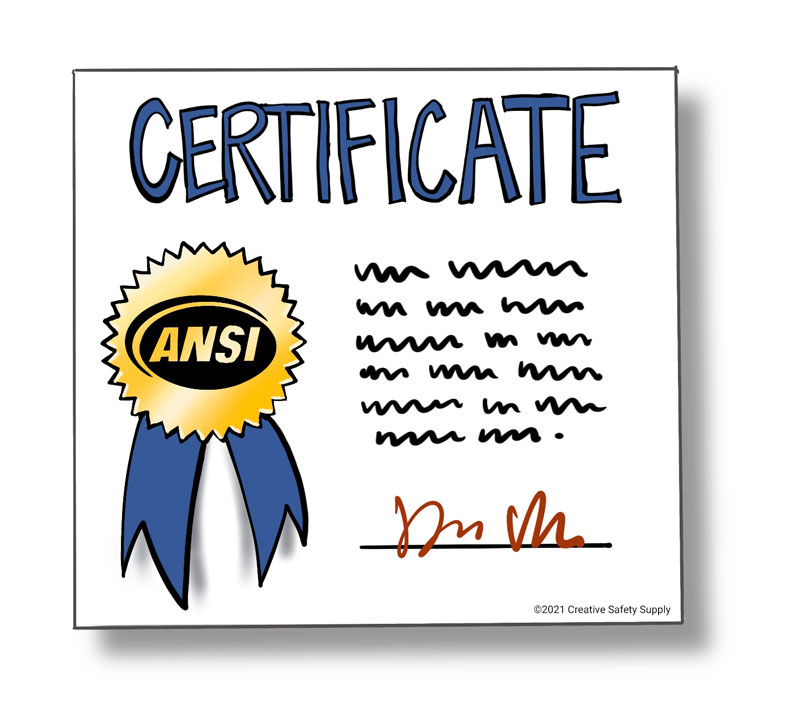
The end result of a completed ANSI certification is proof of compliance with the accreditation standard ANSI/ISO/IEC 17024, which is also called the “Conformity assessment – General requirements for bodies operating certification of persons”. This certification is invaluable to those who receive it because it proves excellence from a successful accredited program in what that individual is trying to accomplish. This certification can come from a variety of accredited programs, including food handlers training programs to oil and gas industry training. Those who are most interested in seeing this outcome for individual workers are employers, credential holders, hiring managers, and leaders in industry.

Now, there is a difference between a certificate and a certification. A certificate is usually received after a training course from a non-standardized often for-profit educational program. It only indicates the completion of a training course by the certificate holder after having accomplished the necessary learning objectives. On the other hand, there are certifications that are granted after the applicant has showcased their skills, knowledge, and abilities in an official profession or occupation. These certifications are awarded by non-profit and standardized organizations and often result in credentials that are listed after that individual’s name. Certifications can also be revoked if the ongoing requirements of keeping that certification are not met and are only valid for a certain amount of time before maintenance of the certification must be completed.
A good example of certification can be found in fire safety training which can be taught to company employees by certified Fire Marshalls. Fire Marshalls receive their certification from the International Association of Fire Chiefs (IAFC) in accordance to NFPA 1037. This agency uses an approved third-party accrediting agency to keep up with those standards and ensure that Fire Marshals are competent in their line of work.
Why get ANSI certified?
There are plenty of reasons why an ANSI certification is such a valuable asset to obtain, these include:
- Reduced liability insurance cost due to a higher accountability and transparency expectation put forth by this ANSI process.
- It serves as excellent legal defense in the case of invalid claims made against the certification holder.
- Many government agencies rely on this type of certification to assure that the program in question is competent in their trainings.
- Lastly, these certifications are valued because they tell employers that the individual with this certification has been reliably assessed in their own ability to practice certain skills or expertise.
Just to name a few!
Additional ANSI Certification facts:
- ANSI certification is a process of verifying that a product, service, or system meets the requirements of a recognized standard. ANSI certification is voluntary and does not imply endorsement by ANSI or any government agency. Source: https://anab.ansi.org/
- ANSI certification can provide benefits such as increased customer confidence, market access, competitive advantage, and compliance with regulations. ANSI certification can also demonstrate social responsibility, environmental sustainability, and quality management. Source: https://anabpd.ansi.org/Accreditation/product-certification/
- ANSI certification is based on the accreditation standard ANSI/ISO/IEC 17024, which specifies the general requirements for bodies operating certification of persons. This standard ensures that the certification process is fair, valid, reliable, and impartial. Source: https://en.wikipedia.org/wiki/American_National_Standards_Institute
- ANSI certification is available for a wide range of industries and occupations, such as food safety, energy efficiency, health care, cybersecurity, and more. ANSI certification programs are developed and administered by various organizations, such as professional associations, trade groups, testing laboratories, and certification bodies. Source: https://www.ansi.org/
- ANSI certification is not the same as ANSI accreditation, which is a process of assessing the competence of organizations that provide conformity assessment services, such as testing, inspection, and certification. ANSI accreditation is based on the accreditation standards ANSI/ISO/IEC 17011 and ANSI/ISO/IEC 17065. Source: https://anab.ansi.org/
Similar Questions
- What are the steps to get ANSI certified?
- What does ANSI stand for?
- Where can I find ANSI standards?
- Which countries use ANSI standards?
- How many ANSI standards are there?
- Can OSHA enforce ANSI standards?
- Who do ANSI standards apply to?
- Are ANSI and ASME the same?
- What are ANSI standards?

